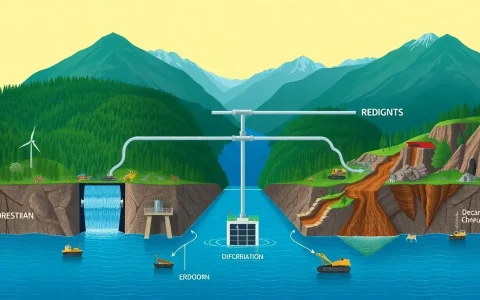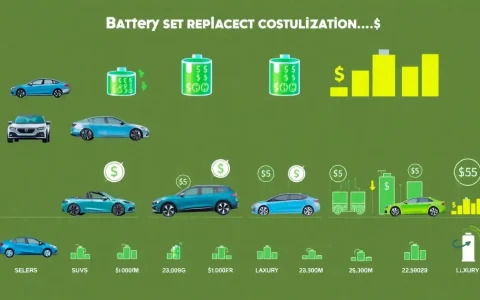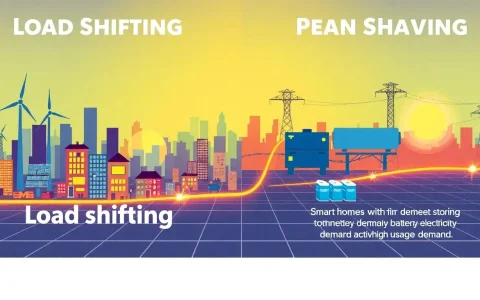
1. Energy storage batteries are utilized across various sectors due to their capacity to store and release energy as needed. 2. Key industries employing these systems include renewable energy, automotive, telecommunications, and grid management. 3. Renewable energy relies heavily on storage solutions to balance supply and demand, facilitating a more reliable energy transition. 4. In the automotive sector, electric vehicles depend on advanced battery technologies for efficient operation and extended range.
1. RENEWABLE ENERGY SECTOR
The renewable energy sector has undergone a remarkable transformation over the past few decades, evolving from niche applications to a critical element in the global energy mix. One of the primary challenges faced by renewable sources such as solar and wind is their inherent intermittency. Energy storage batteries serve as a buffer, allowing for excess energy generated during peak producing hours to be stored and utilized when production wanes. This characteristic is essential for creating a reliable energy supply, facilitating a transition towards cleaner energy sources, and reducing dependence on fossil fuels.
In addition to addressing intermittency, energy storage solutions also enhance the resilience of the electricity grid. By integrating these batteries into the grid, operators can smooth out fluctuations in supply and demand, significantly improving stability. During periods of high demand, batteries can release stored energy, alleviating stress on the grid and reducing the need for additional power plants. This capability is increasingly crucial as the penetration of renewables continues to rise, necessitating greater flexibility and adaptability within the energy infrastructure.
2. AUTOMOTIVE INDUSTRY
The automotive industry is witnessing a seismic shift as the world moves towards electrification. Electric vehicles (EVs) have gained substantial traction, driven by concerns over environmental sustainability and advancements in battery technology. Energy storage batteries are at the heart of this transformation, powering electric drivetrains and enabling features such as regenerative braking. These systems allow EVs to recover energy during braking and store it for future use, thereby enhancing overall efficiency.
Battery technology is rapidly evolving, with manufacturers continually striving to improve energy density, charging speed, and longevity. Lithium-ion batteries dominate the current market, offering a compelling balance of performance and cost. This battery type’s evolution has made electric vehicles increasingly viable, with many manufacturers investing heavily in research and development to achieve breakthroughs. Besides, the implementation of advanced battery management systems ensures optimum operating conditions, thereby prolonging battery life and enhancing vehicle performance.
3. TELECOMMUNICATIONS
Telecommunications networks demand an uninterrupted power supply to maintain service reliability, especially in critical situations. Energy storage batteries are integral to maintaining operations during power outages, ensuring that communication lines remain open and functional. These systems provide a backup energy source, allowing telecommunications companies to uphold service levels and uphold their commitment to customers.
Furthermore, with the increasing reliance on mobile devices and data consumption, telecommunications networks experience a surge in energy demand. Batteries can serve as a strategic resource, helping manage energy fluctuations and maintaining overall system efficiency. By deploying energy storage solutions within their infrastructure, telecom companies can reduce their operating costs, particularly during peak usage times when energy prices are high. This strategy aligns with broader corporate sustainability goals, enhancing both financial performance and environmental stewardship.
4. GRID MANAGEMENT
The management of electrical grids is evolving in response to the growing complexity of energy supply and demand dynamics. Energy storage batteries represent a pivotal technology in contemporary grid management, allowing for the balancing of load and generation. Grid operators can use these systems to store energy during low-demand periods and release it during peak usage, effectively flattening demand curves and improving energy utilization rates.
Moreover, energy storage technologies contribute to demand response programs, where consumers are incentivized to modify their energy consumption based on available supply at any given time. This harmonization helps mitigate the risk of grid overloads and enhances the overall efficacy of energy distribution. As more renewable sources are integrated into the grid, the role of energy storage batteries will likely grow, enabling greater diversification of energy supply and enhancing grid stability and resilience.
5. INDUSTRIAL APPLICATIONS
The industrial sector encompasses a diverse range of activities, each with its unique energy requirements. Manufacturing facilities, in particular, are heavy energy consumers, often requiring substantial power to operate machinery and conduct processes. Energy storage batteries can play a vital role in reducing energy costs and improving operational efficiency.
By implementing battery storage systems, industrial operations can leverage lower energy prices during off-peak hours to charge batteries, which can then be used during peak demand periods. This strategy minimizes reliance on grid-supplied energy, particularly during high-cost times, thus leading to significant cost savings. Furthermore, having a reliable, on-site energy source increases operational resilience, supporting industries in managing unexpected disruptions or fluctuations in energy supply.
6. RESIDENTIAL USAGE
In recent years, residential energy storage has gained popularity as homeowners seek autonomy over their energy consumption. Energy storage batteries provide homeowners with the capability to store surplus energy generated by solar panels and utilize it during times when sun exposure is minimal. This technology not only enhances energy independence but also reduces reliance on the grid, minimizing electricity bills.
In addition to financial benefits, homeowners are increasingly motivated by sustainability concerns. Batteries support the broader integration of renewable energy into the home, allowing for optimized energy use and reduced carbon footprints. Moreover, residential battery systems can serve as backup power solutions during outages, ensuring homeowners maintain essential functions without interruption. As advancements in technology lower costs and improve battery performance, residential energy storage is poised to become a standard feature in modern homes.
7. MARINE AND AVIATION INDUSTRIES
The marine and aviation sectors are also beginning to explore the potential of energy storage batteries for various applications. In marine transportation, batteries are being integrated into hybrid systems, allowing vessels to operate efficiently while reducing emissions. This shift is particularly important within urban environments, where regulations are becoming stricter concerning air quality and sustainability.
Similarly, in aviation, the development of electric propulsion systems relies on advanced energy storage solutions. Batteries could potentially transform short-haul flights, promoting sustainable aviation alternatives. Although the sector is in the early stages of widespread adoption, ongoing research and development are likely to yield significant breakthroughs. Consequently, both industries stand to benefit from the increased efficiency and environmental advantages that energy storage batteries can provide.
8. AGRICULTURAL SECTOR
Agriculture is increasingly leveraging energy storage technologies to enhance productivity and sustainability. Energy storage batteries facilitate the use of renewable sources, such as solar and wind, enabling farms to reduce their dependence on conventional energy sources. This transition not only supports operational goals but also contributes to broader environmental initiatives aimed at reducing greenhouse gas emissions.
Batteries can also be instrumental during critical phases of crop production. For instance, energy storage can contribute to maintaining climate-controlled environments in greenhouses, ensuring optimal growth conditions for plants. Moreover, these systems can alleviate the pressure of energy costs on farmers by allowing them to store excess energy when prices are low, tapping into it during high-demand periods.
CONSTANTLY EVOLVING LANDSCAPE
In summary, the landscape surrounding energy storage battery applications is rapidly evolving. With innovations and technological advancements improving efficiency and reducing costs, the diverse range of industries utilizing energy storage solutions is set to expand further. Continuous investments in research and development will fuel growth across the sectors explored, showcasing the transformative function of energy storage batteries in addressing contemporary energy challenges.
FREQUENTLY ASKED QUESTIONS
1. WHAT ARE THE MAIN BENEFITS OF ENERGY STORAGE BATTERIES?
Energy storage batteries present numerous advantages across various sectors, fundamentally transforming how energy is consumed and conserved. One of the most significant benefits is the ability to store renewable energy. By capturing excess energy during periods of production, especially from solar and wind sources, these systems mitigate the challenges posed by intermittency. This enables a smoother and more consistent power supply, ultimately contributing to the reliable integration of renewables into the energy grid.
In addition to facilitating a cleaner energy landscape, energy storage batteries help enhance grid resilience. By acting as a buffer in times of demand surges or supply shortages, they can provide critical support to operators, ensuring that energy remains stable and accessible. Moreover, they allow consumers — whether residential, commercial, or industrial — to engage in demand response programs, optimizing their energy usage based on fluctuating prices. This not only leads to savings but also promotes a more sustainable approach to power consumption.
2. HOW DO ENERGY STORAGE BATTERIES CONTRIBUTE TO SUSTAINABILITY INITIATIVES?
Energy storage batteries play a pivotal role in sustainability efforts by enabling the efficient use of renewable energy sources. By facilitating the absorption and utilization of energy generated from renewable technologies, these systems are essential in transitioning away from fossil fuel dependence. Through energy storage, surplus energy produced during peak sun or wind periods can be harnessed for later use, thus reducing waste and enhancing overall efficiency.
Furthermore, the adoption of energy storage solutions in residential and commercial sectors contributes to lower carbon footprints. As more individuals and organizations invest in renewable energy systems paired with storage batteries, the combined impact leads to substantial reductions in greenhouse gas emissions. Additionally, energy storage allows for the efficient management of energy consumption patterns, helping align usage with cleaner, more sustainable sources of power. These collective shifts are paramount in addressing climate change and advancing sustainability goals.
3. WHAT FUTURE TRENDS CAN BE EXPECTED IN ENERGY STORAGE TECHNOLOGIES?
Looking ahead, several notable trends are anticipated to shape the future of energy storage technologies, enhancing their effectiveness and broadening their adoption. One key trend revolves around the advancement of battery chemistries aimed at improving energy density, charging speeds, and overall lifecycle performance. Innovations such as solid-state batteries hold promise for delivering greater safety and higher efficiency, potentially changing the landscape of energy storage.
Moreover, integration with smart technologies will likely become commonplace. As grids become more interconnected and reliant on digital systems, the synchronization of energy storage with smart grids will enhance responsiveness to energy demand fluctuations. The incorporation of artificial intelligence and machine learning into battery management systems will enable better predictive analytics, optimizing the operation of energy storage across various applications. Ultimately, as these trends unfold, energy storage technologies will continue to evolve, providing essential solutions to meet the challenges posed by an increasingly complex energy landscape.
In closing, the utilization of energy storage batteries is far-reaching, encompassing a wide array of sectors, each benefiting significantly from this evolving technology. As highlighted, the renewable energy sector stands at the forefront of this transformation, wherein energy storage not just addresses intermittency issues but also allows for a smoother transition toward a sustainable energy future. Additionally, the automotive industry is ushering in a new era of electric vehicles, fundamentally reshaping the automotive landscape, while telecommunications depend on energy storage for unwavering service delivery. Grid management relies heavily on these batteries, ensuring stability in power supply, while industrial and residential applications pave the way for cost savings and efficiency. Agricultural practices are also being revolutionized through energy storage solutions, enabling enhanced productivity while promoting sustainability. The dynamics of marine and aviation sectors reflect a growing interest in integrating energy storage technologies for sustainable transport solutions. Collectively, these applications not only bolster operational efficiency but significantly contribute to global sustainability efforts. Going forward, the trends and innovations emerging in energy storage technologies promise to expand their benefits, leading to a more sustainable and resilient future across all industries. The potential for energy storage batteries is vast, and as advancement continues, the impact on various sectors will become increasingly profound, positioning these technologies as central to tackling energy challenges in a modern context.
Original article by NenPower, If reposted, please credit the source: https://nenpower.com/blog/which-industries-use-energy-storage-batteries/











